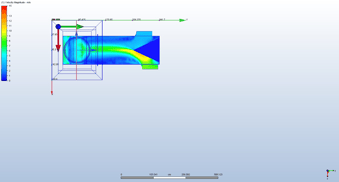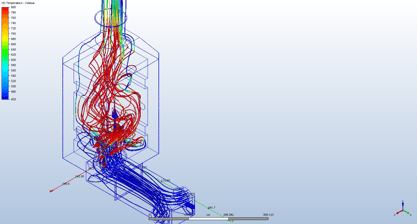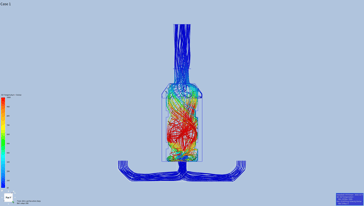Share this
Therser UK Offers Computational Fluid Dynamics (CFD)
by Therser UK on 24-Jul-2023 14:37:03
Fluid dynamics is a captivating field of study that unveils the intricacies of how liquids and gases move and interact with their surroundings. One powerful tool that enables engineers and scientists to unravel the mysteries of fluid behavior is Computational Fluid Dynamics (CFD).
Computational Fluid Dynamics, commonly known as CFD, is a branch of fluid mechanics that employs numerical methods and algorithms to simulate and analyze fluid flow phenomena. By solving the governing equations of fluid dynamics using computational techniques, CFD provides valuable insights into the behavior of fluids in complex systems.

Applications of CFD: CFD finds applications in a wide range of industries, where understanding fluid flow patterns and related phenomena is crucial. Let's explore some of its key applications:
Aerospace: CFD plays a vital role in designing and optimizing aircraft wings, propellers, and jet engines. By simulating airflow around these components, engineers can improve aerodynamic performance, reduce drag, and enhance fuel efficiency.
Automotive: In the automotive industry, CFD is employed to study the aerodynamics of vehicles. By analyzing the airflow around the car body, engineers can minimize air resistance, improve cooling systems, and enhance vehicle stability.
Energy: CFD simulations help engineers optimize the design and efficiency of wind turbines, gas turbines, and cooling systems in power plants. By understanding fluid behavior, engineers can improve energy generation and reduce environmental impact.
Environmental Engineering: CFD assists in studying air pollution dispersion, water flow in rivers and oceans, and the impact of natural disasters like hurricanes and tsunamis. This knowledge aids in designing effective mitigation strategies and predicting environmental impacts.

Methodology of CFD: To perform CFD simulations, engineers employ a systematic methodology that involves the following steps:
Problem Definition: The specific fluid flow problem is identified, and the objectives of the simulation are determined.
Geometry and Mesh Generation: The geometry of the system under investigation is created, and a mesh or grid is generated to divide the fluid domain into small control volumes.
Boundary Conditions and Material Properties: The properties of the fluid, such as density and viscosity, are defined, along with the boundary conditions that dictate the behavior of the fluid at the system boundaries.
Numerical Solution: The governing equations, such as the Navier-Stokes equations, are discretized and solved using numerical algorithms. This step involves iterating through the computational domain to calculate flow properties at each control volume.
Post-Processing and Analysis: Once the simulation is complete, engineers analyze the results, visualizing flow patterns, pressures, temperatures, and other relevant parameters. This information aids in understanding the behavior of the fluid system and making informed design decisions.

Computational Fluid Dynamics (CFD) offers a powerful and efficient means to understand the behavior of fluids in various applications. From aerospace to automotive, energy to environmental engineering, CFD plays a pivotal role in optimizing designs, improving efficiency, and reducing costs. As technology continues to advance, CFD will undoubtedly play an increasingly vital role in shaping the future of fluid dynamics research and innovation.
Contact us today and speak with one of our experts who will describe our service and the manner in which it can resolve your current issues. Call us on +44 (0) 1782 824453 or use our contact form.
Share this
- Company News (90)
- Battery Materials (41)
- kiln (37)
- fabrication (29)
- Alloy (27)
- Furnace (27)
- Welding (16)
- Industrial Kilns (15)
- Battery (13)
- Ceramic Kilns (13)
- Processes (13)
- alloy fabrication (13)
- Shuttle Kilns (12)
- RTO’s (11)
- Vacancies (11)
- Hydrogen (10)
- Therser UK (9)
- Tunnel Kiln (9)
- Refractory (8)
- Therser (8)
- Wellman Furnaces (8)
- Brickwork (7)
- Case Studies (7)
- Afterburners (6)
- Fibre Lining (6)
- electric (6)
- Almor Wellman (5)
- thermal engineers (5)
- Biochar (4)
- Exhibition (4)
- Pyrolysis (4)
- Servicing (4)
- Spares (4)
- heat treatment (4)
- History (3)
- Ceramics Uk (2)
- Combustion Control Upgrades (2)
- Nitrogen (2)
- Temperature Control Rings (2)
- gas (2)
- Certificates (1)
- Instrumentation (1)
- MMC (1)
- RHK (1)
- Roller Hearth Kiln (1)
- Test Trials (1)
- aerospace (1)
- analyser (1)
- elec (1)
- oxygen (1)
- vans (1)
- September 2025 (2)
- May 2025 (2)
- March 2025 (1)
- February 2025 (2)
- January 2025 (5)
- December 2024 (5)
- November 2024 (7)
- October 2024 (5)
- September 2024 (4)
- August 2024 (14)
- July 2024 (13)
- June 2024 (2)
- May 2024 (5)
- April 2024 (13)
- March 2024 (8)
- February 2024 (12)
- January 2024 (14)
- December 2023 (6)
- November 2023 (12)
- October 2023 (24)
- September 2023 (11)
- August 2023 (11)
- July 2023 (9)
- June 2023 (15)
- May 2023 (53)
- April 2023 (5)
- March 2023 (6)
- February 2023 (7)
- January 2023 (3)
- December 2022 (8)
- November 2022 (5)
- October 2022 (11)
- September 2022 (1)
- August 2022 (2)
- July 2022 (1)
- June 2022 (2)
- May 2022 (1)
- March 2022 (1)
- February 2022 (1)
- January 2022 (1)
- December 2021 (3)
- October 2021 (1)
- August 2021 (1)
- June 2021 (1)
- May 2021 (4)
- April 2021 (2)
- March 2021 (4)
- February 2021 (2)
- December 2020 (3)
- November 2020 (1)
- September 2020 (3)
- May 2020 (1)
- April 2020 (2)
- March 2020 (1)
- January 2020 (1)
- December 2019 (1)
- July 2019 (2)
- June 2019 (1)
- April 2019 (2)
- March 2019 (3)
- February 2019 (4)
- December 2018 (1)
- November 2018 (1)
- September 2018 (2)
- August 2018 (1)
- July 2018 (1)
- May 2018 (3)
- April 2018 (1)
- February 2018 (3)
- January 2018 (2)
- December 2017 (3)
- November 2017 (1)
- October 2017 (2)
- September 2017 (4)
- August 2017 (1)
- July 2017 (2)
- June 2017 (2)
- May 2017 (3)
- April 2017 (3)

